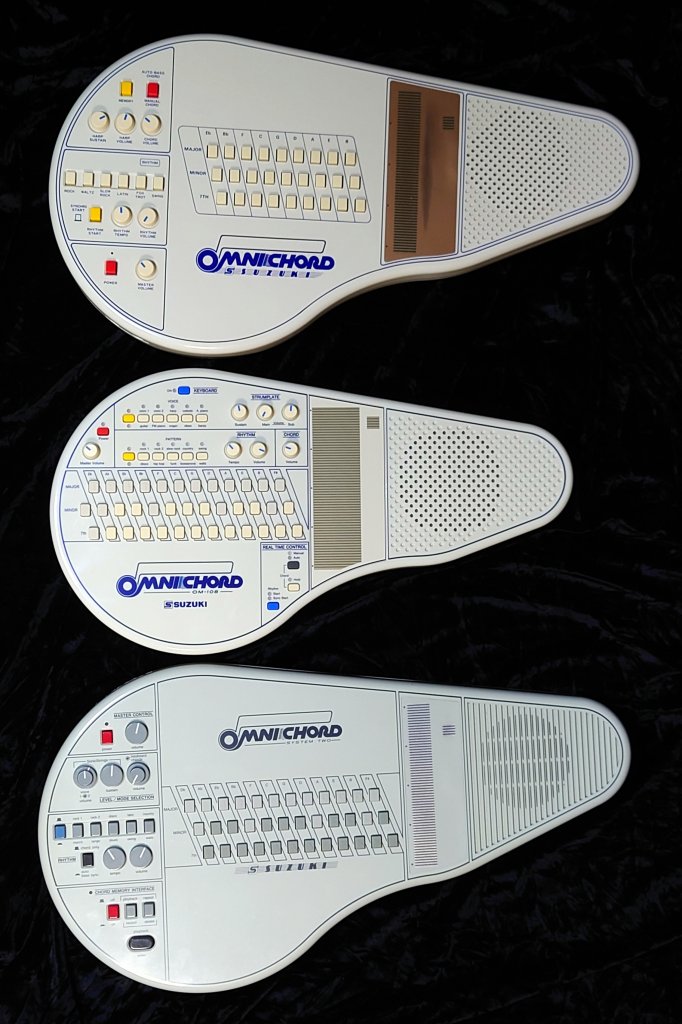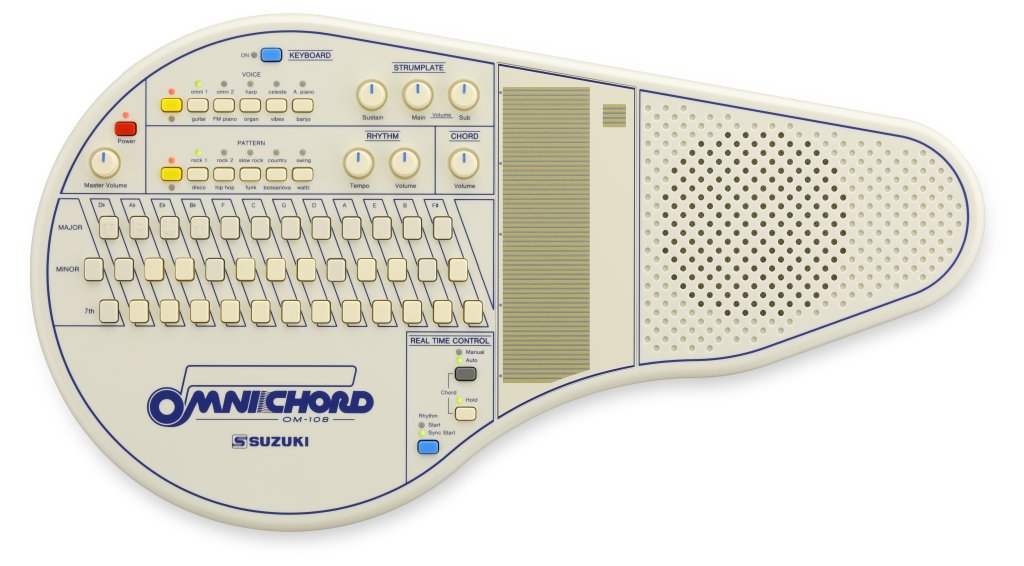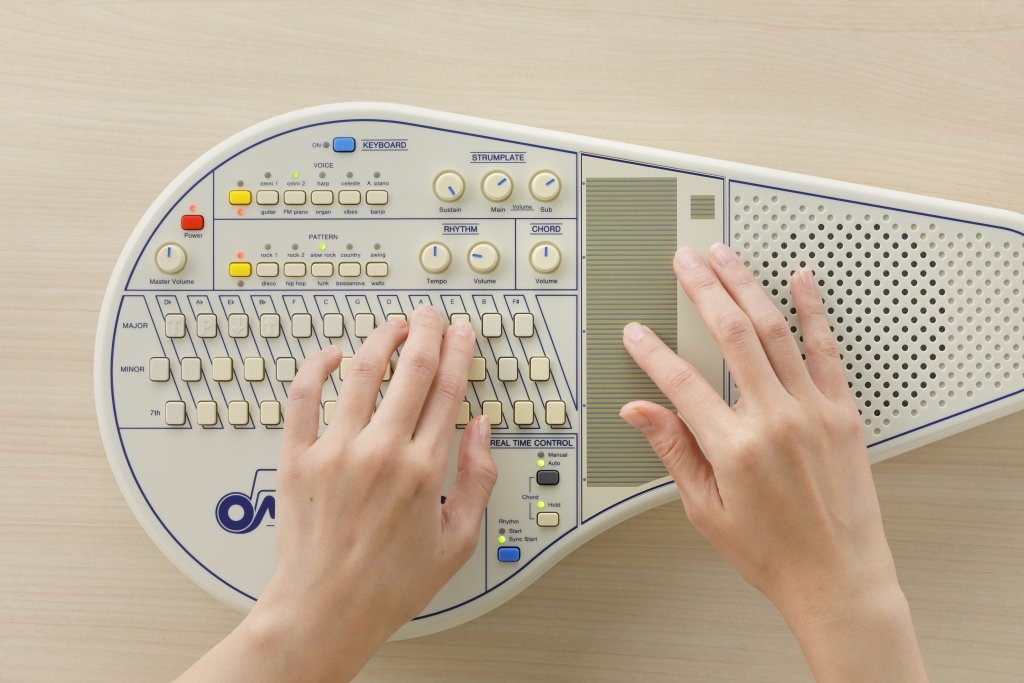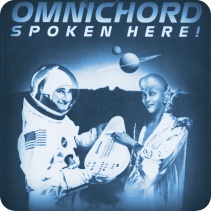Omnichord OM-108 Review
Make Your Own Kind Of Music
Here at Omnichord Heaven we are VERY
excited to show you the brand new Omnichord from Suzuki – The
OM-108. And here is our in-depth review. we will cover the MIDI
functionality soon.
This new instrument has been three years
in the making, and every aspect reflects the requests and wishes of
the Omnichord community, and it is Suzuki’s wish that the OM-108
will continue the 40-year legacy of a unique instrument with a
beautiful sound.
So, first of all let’s look at the overall
design.
The Shape
 The
OM-27 and OM-84 have proved to be the most popular of all model
Omnichords. The OM-84 more than any other model is in great demand
today and we have seen them being sold for well over £700. Suzuki
have retained the much-loved design of the early series, but length
and width reduced slightly as a direct request that it be easier to
perform with and carry. (height is the same).
The
OM-27 and OM-84 have proved to be the most popular of all model
Omnichords. The OM-84 more than any other model is in great demand
today and we have seen them being sold for well over £700. Suzuki
have retained the much-loved design of the early series, but length
and width reduced slightly as a direct request that it be easier to
perform with and carry. (height is the same).
The use of AA batteries means the OM-108
is lighter too, with batteries installed it weighs just over 1.4
kilos compared to an OM-27 with batteries at a little over 1.8
kilos.
The colour has been carefully matched to an original OM-27 ivory, in fact our own OM-27 has been around the world to make sure the OM-108 looks and feels familiar.
The layout.
It is oh, so familiar. Straight away we
feel at home with the OM-108. Everything from the beautifully
printed Omnichord logo to the OM-27 button colours make us feel that
we are playing a real Suzuki Omnichord. The strumplate (which has a
perfect touch) is wider than the original versions meaning those who
are used to the ergonomic plate found on the OM-100 through QC-1
will not be disappointed. The extra width allows for the natural arc
your hand takes as you play. The strumplate is sensitive right up to
each edge meaning no note-misses. The instant-off touch plate is
sensibly located so you don’t hit it by accident.
 |
The buttons are a lovely, soft touch
rubber; as all instruments from the OM-36 and OM-84 onward have
been. The rotary controls are back! This is great news for those who
want to adjust their sound on the fly. Although not as wide as the
OM-84 controls, we had no problems making changes
The location being close to the top of the strumplate is easy to
reach.
You will notice the two additional chord
buttons, these two little buttons allow the expansion of the chord
pallet from 84 chords, to 108 chords! (Hence the name OM-108). The
two new chord types are Sus4 and Add9. Suspended chords have been a
request from players (including myself) for many years. This is a
very exciting addition indeed.
The speaker grill is similar to OM-27 and
the speaker quality is amazing, carrying some serious bass response!
 Looking
on the edge, we see the various sockets at the rear left-hand side
(as per OM-84), meaning cables do not get in the way as you perform.
The eagle eyed will notice the monitor switch, ideal if you are
running the instrument through an external speaker but wish to
monitor your own sound. Except for the first batch of OM-27, all
Omnichords go silent when a jack is inserted. We also noticed
headphone quality is awesome.
Looking
on the edge, we see the various sockets at the rear left-hand side
(as per OM-84), meaning cables do not get in the way as you perform.
The eagle eyed will notice the monitor switch, ideal if you are
running the instrument through an external speaker but wish to
monitor your own sound. Except for the first batch of OM-27, all
Omnichords go silent when a jack is inserted. We also noticed
headphone quality is awesome.
The MIDI out port – for those who wish to
use the Omnichord as a controller are in for a real treat. This port
is one of the main reasons for the delay in release as Suzuki have
put a huge amount of effort into future proofing the OM-108. We will
talk more about this in another article.
Finally, the underside. The little raised
rubber feet are there as always, and the battery box now contains
space for 8 x AA batteries. The good news is we can use NiMH
rechargeable batteries. On our sample a USB port is installed, this
is for firmware updates, and we are not sure if this will feature on
the production model.
Lastly, the commission plate. Even this
was a cause of in-depth discussion. Suzuki wanted to ensure the
colour font and size are familiar to Omnichord owners.
Power on the OM-108 and we are treated to
a little LED display as the instruments readies itself.
 We
press a C chord button, and ROCK 1 begins to play – and guess what,
it sounds very similar to an OM-84, although the pattern has been
updated with a lovely rich ‘omnichordesque’ bass line. We
immediately hear Stevie Wonder singing ‘I Just Called to Say I Love
You’ in our heads. The vamping chords are using Omnichord voicing
similar to an OM-27 or OM-84 and the drum voicing is also very 80s
sounding. But wait….the patterns are long, with a little change
coming in at the end of bar 4. The accompaniment pattern follows
flawlessly as we change chords, even part way through a bar.
We
press a C chord button, and ROCK 1 begins to play – and guess what,
it sounds very similar to an OM-84, although the pattern has been
updated with a lovely rich ‘omnichordesque’ bass line. We
immediately hear Stevie Wonder singing ‘I Just Called to Say I Love
You’ in our heads. The vamping chords are using Omnichord voicing
similar to an OM-27 or OM-84 and the drum voicing is also very 80s
sounding. But wait….the patterns are long, with a little change
coming in at the end of bar 4. The accompaniment pattern follows
flawlessly as we change chords, even part way through a bar.
And then we come to the strumplate. It
has a slightly raised texture like our older models, and responds
very well (even with white gloves on).
And here is the great news….the 'power
on' voice is exactly like our OM-84. There is a good reason for
this…the Omnichord (Omni 1 and 2) voicing is 100% analogue!!! Just
like the OM-84, the dual voice is adjustable, so increasing the SUB
rotary control adds vibrato to the MAIN voice which is straight.
The pattern selection is sensible. There
are only 10, but this represents millions of song possibilities, and
they are generic enough to, as Suzuki say, ‘Make Your own Kind Of
Music’.
Here is a breakdown:
Rock 1 – traditional Rock style rhythm
-
Rock 2 – A Bo Diddley feeling pattern. Something not heard before on an Omnichord. Think George Michael FAITH or Amy Winehouse’ ‘Valerie’
-
Slow Rock – A gorgeous 12/8 pattern with lovely cymbals
-
Country – This works at about any tempo you can throw at it! It’s like the Country found on later model OM series Omnichords.
-
Swing – a traditional pattern similar to previous models.
-
Disco – WOW, this is an absolute powerhouse ‘Four on the Floor’ with hopping octave Bass line! We couldn't resist playing the BLUE MONDAY chord sequence.
-
Hip Hop – A fantastic classic 808 style trap beat. That bass line is thick.
-
Funk – Getting’ Jiggy Wit It!
-
Bossanova - Beautiful Latin pattern with really nice analogue sounding percussion.
-
Waltz – A traditional waltz, EXACTLY like the OM-27 pattern with some slight variation on the bass line at the end of bar 4.
There are various controls for the rhythm
unit. Volume of drums and auto accompaniment are separate (Bass and
chords adjust together). Tempo control has a nice range. A few
options for play in REAL TIME CONTROL. You can use Sync start to
trigger the rhythm when you hit the first chord. ‘HOLD’ keeps it
playing, even when releasing a chord button, turning off HOLD means
the rhythm stops when you release a chord. MANUAL, switches the
accompaniment between vamping and that much loved Omnichord ‘drone’.
Ideal if you are playing ‘sans drums’. Turn off HOLD and the chord
buttons can be played ‘staccato’.
Coming back to the voicing, we already
mentioned the Omnichord voicing is analogue which is incredibly
exciting, and these would have been enough, but Suzuki have given us
a great selection of additional sounds. Omni 1 is 100% OM-84. Omni 2
MAIN is OM-84, but with a very rich Synth/Orchestral string tone on
the SUB. This makes for a MASSIVE Sound. You can hold the
strumplate, and there is no decay, adding more possibilities to
creating your own material.
-
Harp – this really does sound like an actual harp, and the sensitivity of the strumplate is so noticeable. We ‘plucked’ out Canon in D and were stunned to silence – it so lovely! Increase the SUB volume just slightly and those lovely strings layer with the Harp.
-
Celeste – it’s like a playing a music box. Again, the sensitivity of the strumplate makes this voice a real treat to use. Strings on the SUB voice.
-
Acoustic Piano. No plinky-plonky sound here, Suzuki have edited the delay to perfection. Who would have thought Piano would make such a great strumplate voice? Strings on the SUB again.
-
Guitar – A steel string guitar with rich lows and sparkling highs. Again, with perfection in the delay and decay. SUB is strings, but orchestral sounding.
-
FM – Piano. A very 80s sounding electric piano, Very DX-7 sounding with an organ type synth PAD sound on the SUB. I can imagine the SUB voice will be appearing in songs.
-
Organ – remember that Suzuki also own and manufacture HAMMOND ORGANS, so this is a perfect voice for them to get right, with a tremolo (Leslie) type effect. Strings as the SUB.
-
Vibes – Suzuki also manufacture a wide range of mallet instruments and they nailed this as a result. Strings on the SUB voice.
-
Banjo – This is so authentic sounding! The strumplate makes this voice sound great as you 'pick' away. Can’t wait to hear what others do with this sound. Strings on the SUB.
The OM-108 holds an ‘Easter egg’…it has a
hidden OM-84 inside! Turn off the power, and restart using a special
button combination and the drums and accompaniment sound exactly
like an OM-84!
There is keyboard mode.....and Drum Pad
mode which has to be tried to be believed! We found we could use it
to play drum intros. For example, the bass drum at the start of Blue
Monday. If the rhythm unit is running, the strumplate plays the drum
voicing automatically in time to the tempo. This means part way
through a song you can easily create a drum break.
That's it for now. We will cover MIDI in our next review soon!






